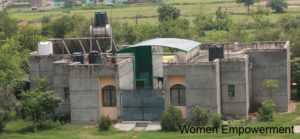Shantigram
History and Background
The Orthodox Church has traditionally been built on the strong foundation of missionary, service and charity related activities. The basic inspiration for this work comes from the communitarian way of life of the early Christians and the early Church fathers. Founded on the bedrock of the living examples set by St. Gregorios of Parumala, the late Pathrose Mar Osthathios and other Church forefathers, the genesis of Shantigram goes back, in particular, to the vision of Dr. Geevarghese Mar Osthathios, the Former President of the Mission Board of the Malankara Orthodox Church, who initially raised the need for such a project in the Diocese, way back in 1998. The proposed project was subsequently discussed at the highest level in the Holy Synod meetings and the final assent was given.
The welfare of the nation lies in the development of our villages and countryside, said the Father of the Nation Mahatma Gandhi. With Christian values as a guiding lamp and a visionary fervor, a historical and revolutionary step was taken by the late Job Mar Philoxenos, the then Diocesan Metropolitan of the Diocese of Delhi in 1998 which blossomed into the form of a project named Shantigram. A community development project of the Delhi Diocese of the Malankara Orthodox Church functioning under the aegis of the Sophia Society, it is situated in the village of Mandawar, in Sohna tehsil of Haryana. This integrated rural development programme aims at the qualitative development of the lifestyle of about 20000 poor and underprivileged inhabitants of 10 villages in and around Mandawar. The project proved to be highly utilitarian and receives much acclaim in the state of Haryana.
The hallmark of Shantigram is to enlighten the people living in developing and unhygienic rural villages located in the Mandawar village. A herculean task of community development was set rolling by providing basic stress on three major aspects namely education, medical and women empowerment.
This hamlet, about 50 kms from the outskirts of the Delhi, saw a beautiful dream unfold by the purchase of a mammoth 25 acres of land in the lap of nature. To realize this visionary journey, it took the efforts of a handful of volunteers and the purchase of a small farm area, which now boasts of the Shantigram Vidhya Niketan, a CBSE affiliated secondary co-educational school, the Shantigram Health Centre, and a centre for women empowerment.
- Shantigram Vidhya Niketan School: With a head count of 538 students that hail from around 30 villages, the school succeeds in inspiring young minds to envision a bright and educated future. The school lays stress on the holistic development of a child by providing them quality yet affordable education. Without mincing words it would not be an exaggeration to credit this success to the hard work of a committed pool of dedicated staff of Shantigram. But much has to be done in the future to bring this incipient plan to its full-fledged realization. Towards this goal, construction has already commenced for the buildings that will provide more infrastructural amenities for the Junior School while laying the basic structure of a Senior Secondary School.

- Shanti Sadan: A boy’s hostel was started to cater to the needs of students who lived far away from Mandawar. With a strength of 18 students from various parts of India provides a home away from home for the students with the amiable and free environment conducive for learning and growth.

- Shantigram Health Centre: With no hospitals within a radius of 15 Km, and the lives of the villagers being maintained in unhygienic environments, they remain vulnerable to numerous afflictions and infirmities. Keeping this in mind, a full-fledged clinic has been functioning since 1998. A team of dedicated health professionals leave no stones unturned to deal with the ailments of the villagers through a clinic that functions bi-weekly and with the presence of a full time residential nurse throughout the week.

- Women Empowerment: From the very beginning, the emphasis was laid on the upliftment of the women by equipping them for a stable and economic tomorrow. In this regard, frequent awareness programs and training classes are held to make them self-reliable and provide them with a secure source of livelihood.
- Orphanage for the poor and the destitute: An orphanage for the destitute and orphaned had been a dream of Mar Osthathios, when he had mooted the idea of this project in the beginning. As a part of this an hostel is being run which takes care of the sustenance of the children, by the means of providing scholarship and living conditions for their comprehensive development of such children.
Conclusion
All these projects have now been brought under the aegis of the Mar Philoxenos Centre for Human and Social Development. As these projects envision a community renewal and revival, they serve to commemorate the memory of Job Mar Philoxenos whose primary vision continues to guide them. As such they agree with the aspirations of the multi-religious community of Mandawar. There are three explicit objectives by which it was formed.
- Basic Education: establish crèche, pre-school, primary education and non-formal classes.
- Community health: set up morning clinic, a hospital and have field based education in health, nutrition, sanitation and family planning.
- Economic security: create income generating activities and establish women group and actions for self-employment, a safe environment and other related concerns.
Indeed, it is a people-centered, multi-sectorial and holistic social support system, for and with the rural community.



